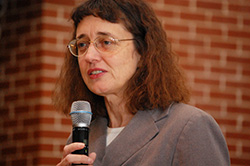Astrophysicist Reflects on Science, God, and Jesus in North Park Lecture Series

Campus Theme speaker Dr. Jennifer Wiseman comments on 'What is Nature?'
CHICAGO (March 4, 2013) — New telescopes have enabled humans to see billions of miles into the universe and billions of years back in time, said , director of the , American Association for the Advancement of Science. Being able to witness God's creation in this way has led to her conclude that "God is a grand and creative God," she said.
Wiseman made the comments in a March 1 presentation to ������ students, faculty, and staff. She was invited to speak as part of the 2012–2013 on the topic, "What is Nature?" Wiseman is also senior project scientist for the at NASA's Goddard Space Flight Center, Greenbelt, Md. She was the 2001–2002 , American Physical Society, and served with staff of the Committee on Science of the U.S. House of Representatives. Wiseman spoke her own views from the perspective of a Christian astrophysicist.
"It's an exciting time for science in general," Wiseman observed. Astronomers generally agree that the universe began with "a spectacular energetic burst" about 13.7 billion years ago, she said, and much has been learned about its origins through the Hubble Space Telescope. Wiseman highlighted her comments by showing the audience several images from the Hubble Telescope, as well as her own cell phone video of the launch of a mission to maintain the telescope.
Images from telescopes such as the Hubble remind people of the sense of wonder, she told the audience. "We're getting some kind of message from the heavens declaring the glory of God. That is the first and foremost response we ought to have as we look at the heavens above and nature around us," Wiseman said. Newer, infrared telescopes enable scientists to see distant galaxies, and to see farther back in time and space. A new infrared space telescope with expanded capacity is expected to be launched into Earth orbit in 2018, she said.
Though Wiseman cautioned against using science to try to "prove God," she said that based on her own faith perspective and inferences, science can contribute ideas about the nature of God. "I do think we can at least understand from a faith perspective that our God is a grand and creative God," she said. She urged that people of faith talk about issues involving science. Wiseman also noted that when nature is mentioned in Scripture, such as in , it is often brought up in the context of praise.
Jesus fits well in God's creation story, Wiseman observed. "There's a strong connection. Jesus was not just an afterthought of God's, but actually, he was the focus of creation for all time in terms of the Scripture, and that it is in Christ that the whole universe is sustained," she said, quoting .
Wiseman was the fourth and final speaker in an impressive lineup of Campus Theme lecturers who addressed the nature topic this academic year, said , director of the Campus Theme Lecture series, assistant professor of philosophy, and director of general education. Previous speakers were Sir Peter Crane, dean of Yale University's School of Environmental Studies, author, and former director of the Royal Botanical Gardens in Great Britain, Chicago's Field Museum, and of the University of Chicago's geophysical science program; Dr. Vandana Sheeva, an internationally known environmental activist and Nobel Peace Prize nominee; and Barry Lopez, a best-selling nature writer and National Book Award winner.
Speakers for next year's Campus Theme Lecture series will address the topic, "What is Peace?"
Use @npunews to . For further information or resources, contact John Brooks, Director of Media Relations and News, or at (773) 244-5522. Learn more .
Next Steps
Learn more about undergraduate programs in the at ������.

